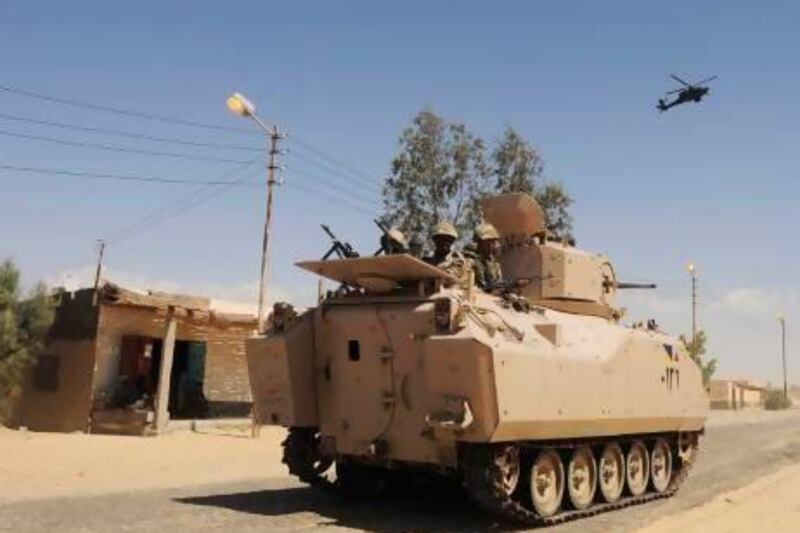CAIRO // Dozens of Islamist militant insurgents were killed, wounded or captured yesterday in a large-scale Egyptian military offensive in Sinai.
Helicopter gunships bombed suspected militant hideouts and armoured vehicles surrounded the areas south of the town of Sheikh Zuwayid and close to the Gaza Strip on the eastern fringes of the region.
Nine insurgents were killed and nine more arrested, and troops captured an array of weapons at bases used by extremists, the army said last night.
Sinai has long been a stronghold of drug smugglers and Islamist militant groups and there has been a dramatic escalation in violence since the fall of the Islamist-led government in early July.
The railway line on the eastern edge of the desert between Ismailia and Suez was closed yesterday after three bombs were discovered on the track. The mortar rounds were timed to detonate under a train scheduled for 6am, state media said. Video of a rocket attack on a Chinese cargo boat on the Suez canal last week was posted online by a militant group.
The canal is one of the few sources of revenue left for the crumbling country, which tourists and international investors have fled.
The military has publicised several recent operations in Sinai. It said on Facebook last week that it had captured local Muslim Brotherhood leader Radi Hussein, who is accused of attacking a police station and stealing weapons.
On September 3, the army said airstrikes had killed and injured 23 "terrorists" who had been targeting military outposts in northern Sinai. Security forces also destroyed buildings that housed the hardline Islamists known as takfiris, it said. Soldiers have been constantly combing the vast area.
The military, which removed the Islamist president Mohammed Morsi on July 3, has insisted that his Muslim Brotherhood support base is involved in terrorism and that the rise in attacks - including a bombing targeting the interior minister in Cairo on Thursday - was a result of the group's activities.
Dozens of the Brotherhood's leadership have been rounded up and imprisoned and now face charges ranging from incitement to murder to plotting to escape from jail. The movement appears now to be in disarray, with numbers of demonstrators at weekly rallies substantially diminished, though still vocal.
New charges were brought against Mr Morsi yesterday. In addition to the prison break and incitement to violence allegations, he now faces charges of insulting the judiciary.
It is not known if the charges relate to a particular statement, but Mr Morsi had a troubled relationship with the judiciary during his time in office. In November last year he dismissed the panel writing a new constitution and issued a decree giving himself sweeping powers, a move that was highly unpopular with some of the legal establishment.
State media said Mr Morsi would continue to be detained at an unknown location for four more days while the new charges are investigated.





